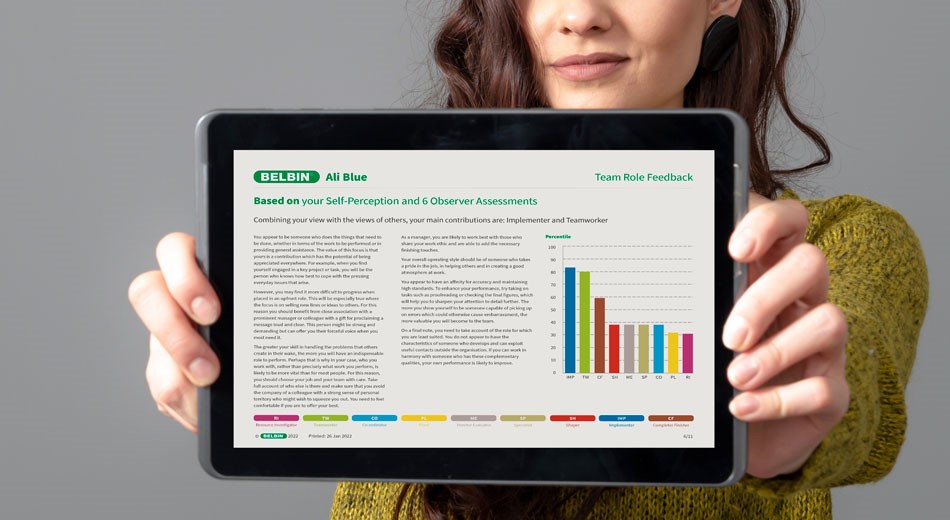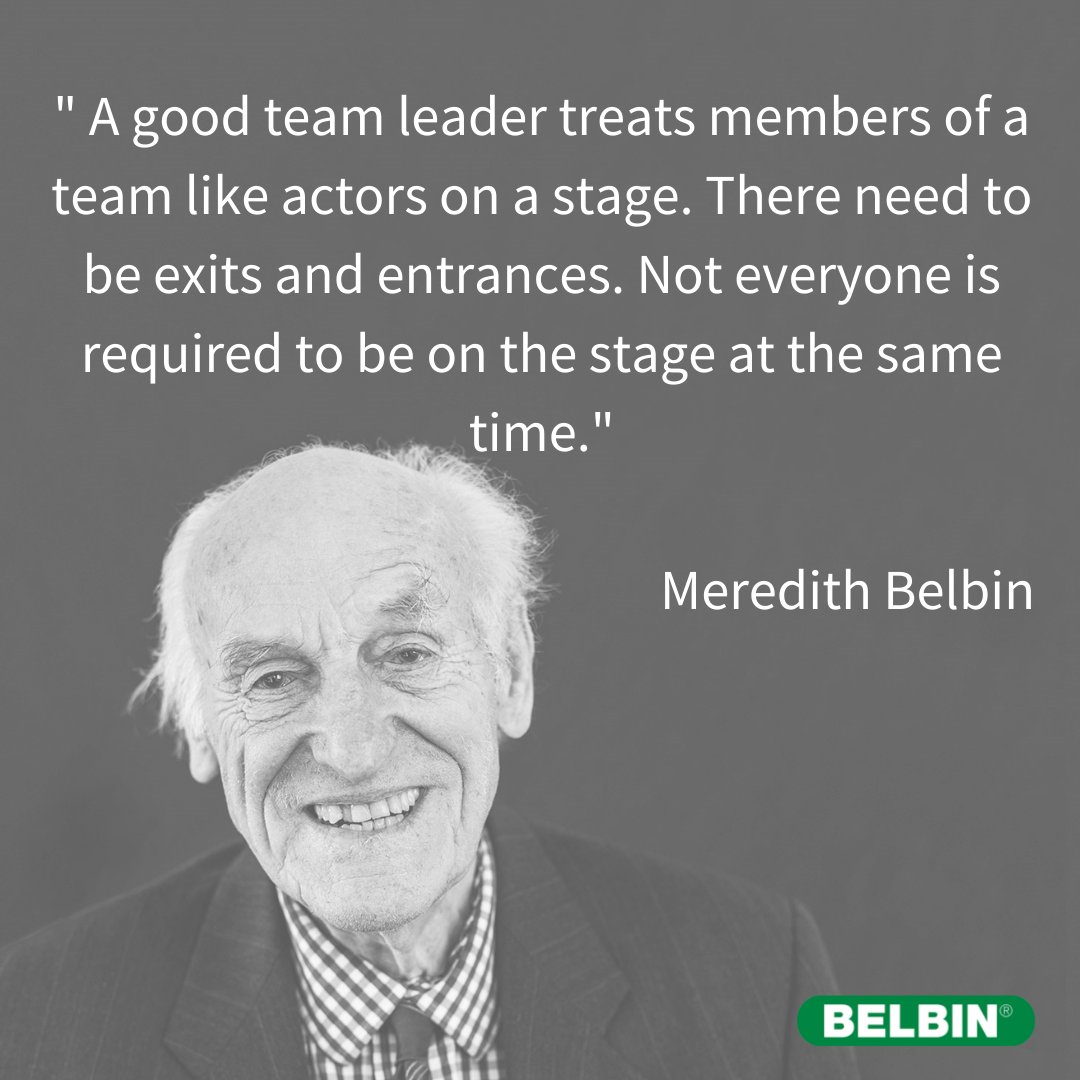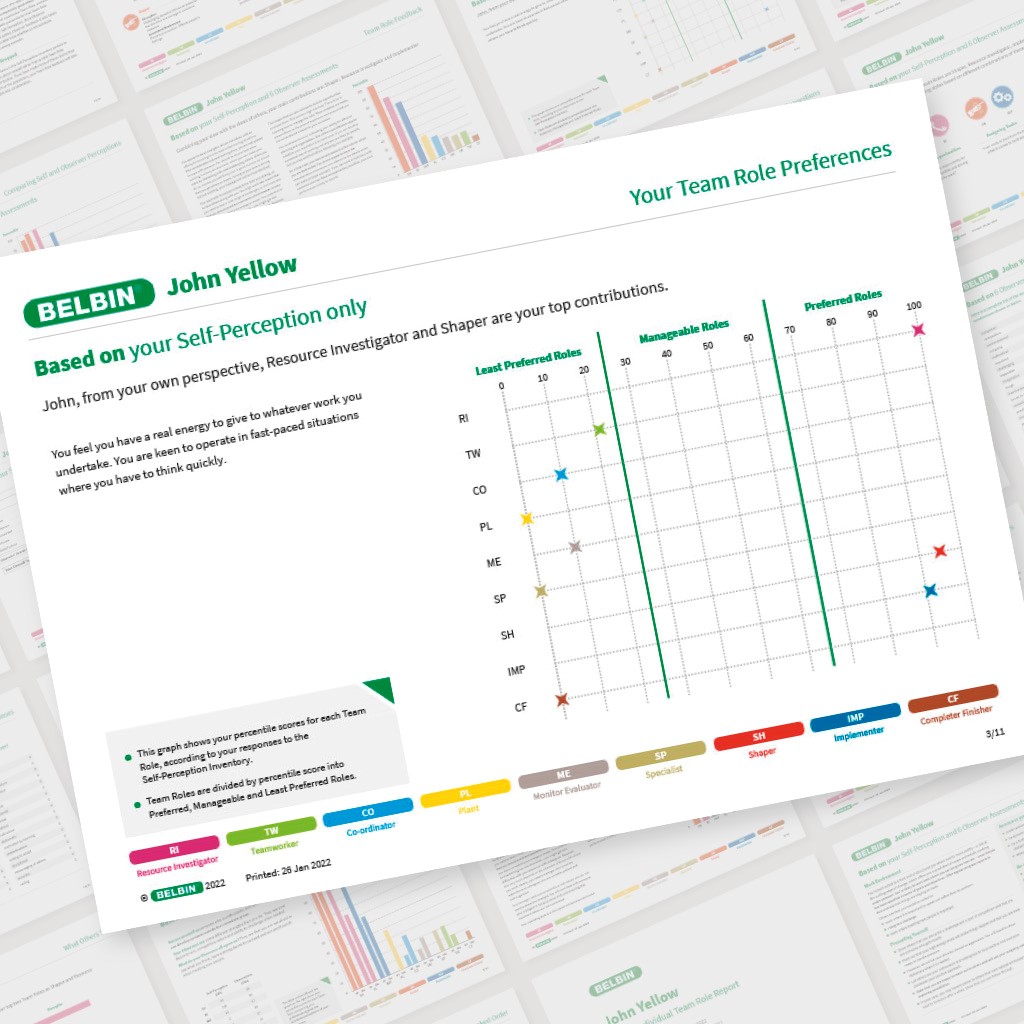What is a BELBIN Individual Report?
A BELBIN Individual Report is the basic building block of the BELBIN framework, as all teams start with bringing individuals together. It is Self-Awareness, in behavioral Team Role language.
Dr Meredith Belbin defines a 'Team Role' as one of nine clusters of behavioural attributes identified by his research at Henley as being effective in order to facilitate team progress.
If you want to know WHY to use BELBIN, before knowing WHAT the nine Belbin Team Roles are.. Please read here
Dr. Meredith Belbin's research showed that the most successful teams were made up of a diverse mix of behaviours. To build high-performing teams, we need to represent each of the nine Belbin Team Role behaviours at the appropriate times.
The nine Belbin Team Roles are: Resource Investigator, Teamworker and Co-ordinator (the Social roles); Plant, Monitor Evaluator and Specialist (the Thinking roles), and Shaper, Implementer and Completer Finisher (the Action or Task roles). You can find more detail about each Team Role below.
The only sanctioned way of finding out your Belbin® Team Role strengths and weaknesses is by completing the official Belbin® Self-Perception Inventory online. You then ask for feedback from people you work with. Your Belbin® Individual report thus gives you valuable insights in to which Team Role behaviors you prefer, and which behaviors others see and value.
Over 3 million Belbin® reports have been generated worldwide for individuals, managers, teams and organisations. Contact us to start your Belbin® journey!

Uses their inquisitive nature to find ideas to bring back to the team.
Strengths: Outgoing, enthusiastic. Explores opportunities and develops contacts.
Allowable weaknesses: Might be over-optimistic, and can lose interest once the initial enthusiasm has passed.
Don't be surprised to find that: They might forget to follow up on a lead.

Helps the team to gel, using their versatility to identify the work required and complete it on behalf of the team.
Strengths: Co-operative, perceptive and diplomatic. Listens and averts friction.
Allowable weaknesses: Can be indecisive in crunch situations and tends to avoid confrontation.
Don't be surprised to find that: They might be hesitant to make unpopular decisions.

Needed to focus on the team's objectives, draw out team members and delegate work appropriately.
Strengths: Mature, confident, identifies talent. Clarifies goals.
Allowable weaknesses: Can be seen as manipulative and might offload their own share of the work.
Don't be surprised to find that: They might over-delegate, leaving themselves little work to do.

Tends to be highly creative and good at solving problems in unconventional ways.
Strengths: Creative, imaginative, free-thinking, generates ideas and solves difficult problems.
Allowable weaknesses: Might ignore incidentals, and may be too preoccupied to communicate effectively.
Don't be surprised to find that: They could be absent-minded or forgetful.

Provides a logical eye, making impartial judgements where required and weighs up the team's options in a dispassionate way.
Strengths: Sober, strategic and discerning. Sees all options and judges accurately.
Allowable weaknesses: Sometimes lacks the drive and ability to inspire others and can be overly critical.
Don't be surprised to find that: They could be slow to come to decisions.

Brings in-depth knowledge of a key area to the team.
Strengths: Single-minded, self-starting and dedicated. They provide specialist knowledge and skills.
Allowable weaknesses: Tends to contribute on a narrow front and can dwell on the technicalities.
Don't be surprised to find that: They overload you with information.

Provides the necessary drive to ensure that the team keeps moving and does not lose focus or momentum.
Strengths: Challenging, dynamic, thrives on pressure. Has the drive and courage to overcome obstacles.
Allowable weaknesses: Can be prone to provocation, and may sometimes offend people's feelings.
Don't be surprised to find that: They could risk becoming aggressive and bad-humoured in their attempts to get things done.

Needed to plan a workable strategy and carry it out as efficiently as possible.
Strengths: Practical, reliable, efficient. Turns ideas into actions and organises work that needs to be done.
Allowable weaknesses: Can be a bit inflexible and slow to respond to new possibilities.
Don't be surprised to find that: They might be slow to relinquish their plans in favour of positive changes.

Most effectively used at the end of tasks to polish and scrutinise the work for errors, subjecting it to the highest standards of quality control.
Strengths: Painstaking, conscientious, anxious. Searches out errors. Polishes and perfects.
Allowable weaknesses: Can be inclined to worry unduly, and reluctant to delegate.
Don't be surprised to find that: They could be accused of taking their perfectionism to extremes.
Belbin Team Roles isn't just a theory, it's a practical tool to help individuals, teams and organisations work more effectively to achieve business objectives. The only way of finding out individual Belbin Team Role strengths and weaknesses is by completing the Belbin questionnaires and receiving a fully normed and researched Belbin Individual report crammed full of advice and guidance.
Once you have the Belbin Individual reports to hand, conversations can start, and change can begin to happen.


It's not always necessary to have all Team Roles working simultaneously. It's important to consider the team objectives, and then work out which tasks need to be undertaken. Once this has been done, discussions can take place regarding how and when each Belbin Team Role behaviour should be utilised.
Using the Belbin reports can give people a greater understanding of their strengths, which leads to more effective communication in the team. Managers can put together great teams, enhance the performance of existing ones, and ensure that everyone feels that they are making a difference in the workplace.
Although there are nine Belbin Team Roles, this doesn't mean that every team requires nine people. Most people will have two or three Belbin Team Roles that they are most comfortable with, and this can change over time. Each Belbin Team Role has strengths and weaknesses, and each role is equally important to the team's success. To find out the Belbin Team Role strengths of individuals and teams, you need to use the Belbin reports.

Over 3 million Belbin® Reports have been generated worldwide for individuals, managers, teams and organisations. Contact us to start your Belbin® journey!
If you want to know WHY to use BELBIN, Please read here
A BELBIN Individual Report is the basic building block of the BELBIN framework, as all teams start with bringing individuals together. It is Self-Awareness, in behavioral Team Role language.
Dr Meredith Belbin’s research showed that high performance teams have the right blend of all the nine Team Roles or behavioral contributions. BELBIN Team Reports serve to predict possible team performance, given the behavioral contributions of its individual members, as revealed in their BELBIN Individual Reports.
Is it possible to foresee the nature of a working relationship between two people, even before such pairs are formalized? What could be the potential risks in getting chalk and cheese together? On the other hand, what could be the potential benefits of teaming up cheese with bread?
Square pegs in round holes are sure to damage the peg, the hole, and the entire mechanism this match is meant to support. First things first. Did the Recruiter know the exact profile of the hole to be filled? A BELBIN Job Report details the behavioral contributions that best serve the job's purpose. In doing so, it tangibilises in advance, the softer specs that often surface when it's too late..
How does a recruiter figure out well in advance, if the new hire will come in like a breath of fresh air, or a bull in a china shop? A BELBIN Job Comparison Report predicts 'suitability'.. the match between the behavioral demands of the job with the behavioral preferences of the prospective recruit.